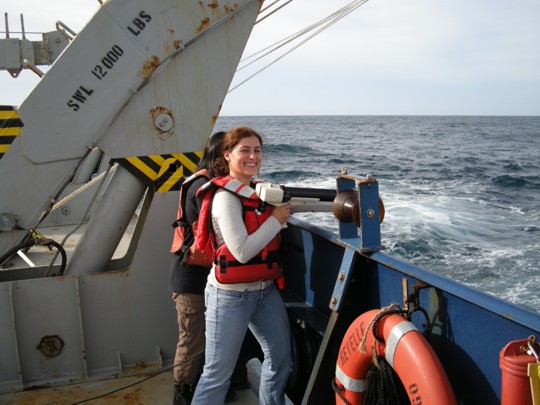Denise Fernandez
Denise Fernandez is originally from Argentina and has a long-standing fascination with the ocean. She completed her undergraduate studies at Victoria University of Wellington, majoring in geophysics and mathematics and now has her Masters in Geophysics within the School of Geography, Environment and Earth Sciences focussing on physical oceanography. Denise went on to work at NIWA as a Physical Oceanographer.

"The ocean plays a vital role in the climate system. It distributes heat, salt and dissolved gasses around the planet. Any change occurring in the climate, such as changes in temperature, or the strength and position of winds will have an impact on the air-sea interactions", explains Denise.
Denise's work involved aspects of a range of topics from meteorology to geophysics and was supported by her supervisors from the Antarctic Research Centre.
One of the things that Denise enjoyed most about her studies was the fieldwork. She has been at sea in the Southern Ocean twice, helping to collect and process data. "There is nothing better than spending a few weeks at sea and getting to see dolphins, whales and albatross. I have also been to places that have never been explored before, have mapped the bottom of the ocean and discovered old river channels and seamounts. I have even collected water samples from depths of thousands of meters below sea level. Being at sea is something really special".
Denise's research, focused off eastern New Zealand, established a link between wind forcing and ocean currents thus helping to improve projections of the ocean state in the West Pacific Ocean and future ocean conditions around New Zealand. "This is one of the three places in the world where the cold Antarctic Circumpolar Current meets the warm southward flow of a subtropical gyre".
"This region is known as the confluence zone and is characterized by oceanic fronts, which are strong temperature and sea surface height gradients forming the boundaries between ocean currents. The confluence zone also exhibits very turbulent flows known as eddies. Eddies are like the weather systems of the ocean and can move and influence oceanic fronts. Winds are the major drivers of the upper ocean circulation and strongly determine the positions of frontal systems".
Denise found the work challenging but motivating at the same time. She "had some very good advice from staff in the School and Centre" who also encouraged her to pursue her goal of being a scientist.
